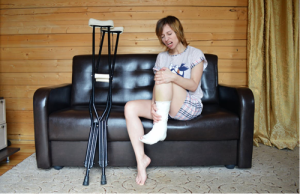

Home Services Workers Compensation & Workcover Knee Injury Compensation
Knee Injury Compensation
Knee Injury Compensation
The knee is a complex hinge joint, made up of tendons that connect the bones to the leg to provide movement, ligaments that join the knee bones together to provide stability, and cartilage which cushions the movement of the joint. The patella or kneecap sits in between the thigh and shin bones and protects the tendon and ligament structures in the knee. As the knee is one of the largest and most complex joints in the body, it may be injured in a number of ways. If you have sustained an injury to this part of the body, you may be eligible for knee injury compensation. Some common injuries include:
- Ligament sprains and tears: These injuries usually occur when ligaments are stretched beyond their capacity, such as in the case of a sudden twist, over extension or excessive force placed on the joint. The anterior cruciate ligament (ACL) can rupture, requiring reconstructive surgery.
- Cartilage tears: The meniscus (cartilage in the knee) operates as a ‘shock absorber’ for the joint. Cartilage tears occur as a result of twisting, awkward movements or severe impact.
- Tendon tears: The knee tendons can tear and bleed when overstretched. The most common cause of a tendon tear is a direct impact to the front of the knee from a fall or other severe blow.
Common causes of knee injuries
Common symptoms of knee injuries include swelling, bruising, pain, instability, loss of range of motion and an inability to straighten the leg. People who have sustained an ACL injury often report hearing a loud ‘pop’ or experience a popping sensation in the knee.
Work-related knee injuries are common, accounting for around 10% of all serious injury claims in the workplace. Safe Work Australia reports that in 2017-18, over 10,000 workers had a workers compensation claim accepted for a serious knee injury. While mild injuries may heal themselves and require only a short period of recovery, more severe knee injuries may require surgery and can prevent an injured person from returning to work for an extended period of time.
Knee injuries can happen in a number of ways and are most commonly sustained as a result of falls and collisions, sudden twists, awkward movements, excessive force or overuse. Examples include:
- stress on the knee while lifting, carrying or putting down objects;
- slips, trips and falls;
- stepping or kneeling on objects;
- a direct blow to the knee or having an object fall on it;
- being hit by a moving object like a vehicle, forklift or industrial machinery.
When can I claim compensation for a knee injury?
In Victoria, the WorkCover scheme provides compensation for workers who have sustained an injury in the course of their employment. If you have sustained a knee injury at work, you may be entitled to claim compensation under the scheme.
WorkCover is a ‘no-fault’ scheme, meaning that injured workers are able to make a claim regardless of who is at fault. The injury does not need to be serious in order to make a claim, although the severity of the injury may limit compensation entitlements.
In some cases, if you have suffered a serious injury at work as a result of your employer’s negligence, you may also be able to pursue a common law claim for damages. Your employer has a duty of care to provide you with a safe workplace. If this has been breached and you have sustained a serious injury or illness, you could be entitled to seek compensation for your pain and suffering and loss of income.

Is there a time limit for making a knee injury claim?
Under the WorkCover scheme, you must notify your employer of your knee injury within 30 days of becoming aware of the injury. You must also lodge a WorkCover claim form as soon as practicable following the injury. If your WorkCover claim is rejected, you have 60 days to dispute the decision to the Accident Compensation Conciliation Service.
A common law claim for damages in relation to an injury sustained as a result of your employer’s negligence must be brought within six years of the date of injury. In some circumstances, the time limits can be extended, so it is important to obtain legal advice as soon as possible.
How much compensation can I get for a knee injury?
The amount of compensation you may be entitled to will vary depending on the circumstances of the workplace accident or injury. Broadly speaking, you may be able to claim:
- Medical and hospital expenses including treatment and rehabilitation costs;
- Weekly payments (a percentage of your regular wages if you are unable to work);
- A lump-sum payment if the accident results in permanent impairment;
- Damages for pain and suffering, loss of enjoyment of life, loss of amenities and potentially also loss of income (past, present and future) if the injury occurred in negligent circumstances and is serious;
- Legal costs associated with your claim.
How long will it take to get compensation for a knee injury?
The time is taken to get compensation largely depends on the severity of the injury and the compensation sought.
Decisions regarding weekly payments are usually made within 28 days from the date of making a valid WorkCover claim. If your claim is accepted, weekly payments will usually begin within seven days.
Approved medical and treatment expenses can be invoiced to your employer or to WorkSafe directly. If you choose to pay a medical bill at the time of service, you should be reimbursed within 30 days from the day WorkSafe receives your receipt. Importantly, WorkSafe will only pay for the approved cost of treatment.
If you work-related knee injury has resulted in a permanent impairment, you may be also be entitled to a once-off lump sum payment called an impairment benefit. WorkSafe has up to 120 days to determine whether you are entitled to an impairment benefit once your level of impairment has been assessed.
Claims for damages arising from an employer’s negligence involve complex legal questions and may require the matter to be determined in a court of law. Timelines for resolution can vary greatly and we recommend seeking legal advice before pursuing a claim.
What to do if this information applies to you
At Gordon Legal, we understand that compensation claims are personal. For personalised and individual advice, we offer consultations to discuss your matter.
Please call Gordon Legal (Melbourne) on 1800 21 22 23 or our Geelong office on 1800 21 22 23 to speak with a member of our team.

No win, no fee
Help when you need it most without the added stress of upfront legal fees engaging a
no win, no fee lawyer. When you need legal help, understandably, the first thing people often think is ‘can I afford it?’ To address this, our Senior Partner, Peter Gordon and Partner, Paul Henderson pioneered the ‘no win, no fee’ system to create greater access to the legal system.
We are here to help
When you’re ready, give us a call or click on the button below to send us a message. It will go straight to a caring and committed member of our team who will contact you within 24 hours.
